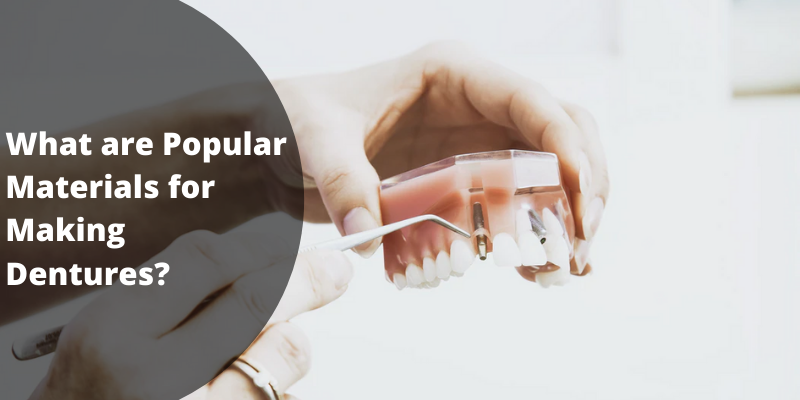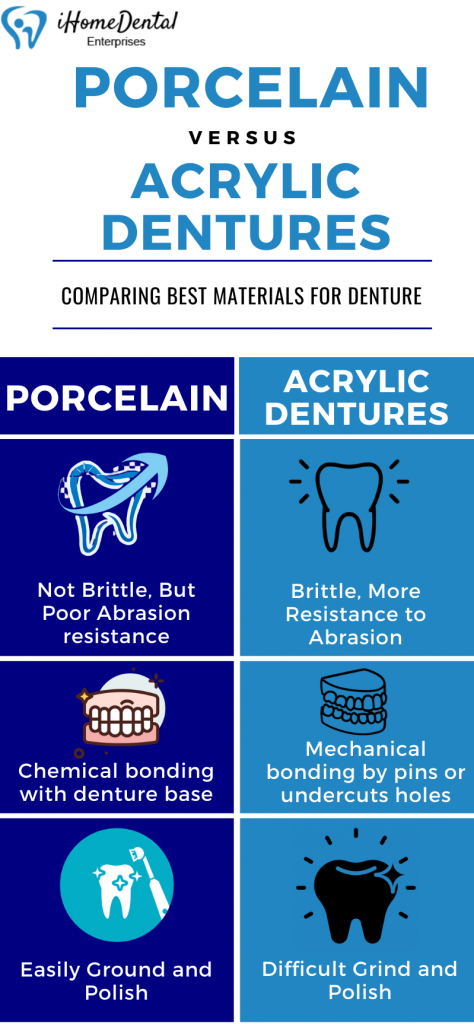
If you are going to bridge the gap between your teeth and going to opt for dentures, you must know what these dentures are made of. In my previous article, I discussed that if a person is allergic to some material, he must glance at the denture material before making a decision.
Although dentures are manufactured with different materials, including porcelain, acrylic, metal, acrylic resin, and flexible material, the most popular are porcelain and acrylic. They are considered the best material for dentures which are widely used by denturists to customize dentures for you.
However, selecting an appropriate material for your customized denture teeth is essential because the right material can impact drastically on your comfort level. Thus, you must discuss the material with your denturists so that he guides you with the most suitable denture material for you.
Let’s discuss these two best materials for dentures and see how they vary from each other.
Porcelain vs. Acrylic Dentures

To differentiate between the porcelain and acrylic dentures, I have covered several points which prove which material is best amongst the two.
● Friction
Porcelain is a much tougher substance as compared to acrylic material which makes dentures sturdier. Besides, the porcelain material resists friction and helps you move your jaw effortlessly. It also helps in preserving your alignment for an extended period.
On the other hand, the acrylic substance is vulnerable and can be easily cracked or broken. It causes friction with the passage of time that may hurt your teeth.
● Strength and Durability
In contrast with acrylic dentures, porcelain dentures are more disposed of stains and cracks. However, it is a much harder material that provides more strength and durability to your dentures. Porcelain is better in terms of the abrasion of teeth and aids in enhancing the jaw movements while wearing them as flippers or any other dentures.
On the flip side, acrylic dentures are more likely to be fractured or damaged earlier than porcelain. If you are looking for temporary dentures, then acrylic could be the better option for you because they appear more like natural teeth. But one downside you would encounter is it causes more friction in your mouth while talking or eating, which leaves a pretty awkward situation. Concisely, acrylic dentures are not suitable for long-term usages like porcelain.
● Cleaning and Maintenance
As discussed earlier, porcelain dentures are more susceptible to stains and tints, which require more care and cleaning over time. Porcelain dentures should be cleaned by dipping them in clean water and clean them with a soft towel to diminish the risk of marks. However, this material is relatively easier to clean because of the tough surface where bacteria can easily be removed.
Alternatively, acrylic dentures resist chips and stains, but they are at high risk to carry microbes in-depth such as bacteria. However, you can efficiently remove these microorganisms by soaking them in water overnight and brushing your teeth frequently. Unlike porcelain substances, the bacteria can grow rapidly, which causes bad breath, bleeding gums, or other problems.
● Bone Injury
Patients who have bone injury complaints in their jaws or face insalubrious gums are more suggested to use acrylic dentures because while eating, the pressure would be on dentures that would further deliver it to your bone ultimately it would cause bone injury. However, a continuous force on the jawbone can impact harshly on your bite and can block the dentures. While biting food, if your dentures do not bump into each other rightly, it can further cause destruction to your bone.
Besides, porcelain teeth have the tendency to put more force on jawbones and gums, which could be more harmful to people who are already experiencing bone problems. Porcelain material delivers this force with high intensity as compared to acrylic while chewing, tapping, or clenching teeth.
● Cost
Most importantly, the cost is one of the key elements which cannot be negotiated. However, you would be pleased to hear that the cost difference between the two denture materials is not substantial. You can get both substances at approximately the same price. Consequently, you can choose either material but be assured of other factors which suit you the most.
Final Words
Acrylic and Porcelain dentures are quite comparable in terms of price, but they are rather different in other factors. However, acrylic dentures give a more natural appearance and are suitable for temporary or short-term usage. Besides, if you are suffering from jawbone or gums issues, then acrylic dentures are best for you. Other than that, porcelain is more durable than acrylic dentures and can opt for long-term dentures. Whatever substance you choose, make sure to maintain and clean it often and give them a regular checkup.





Leave a Reply